The AMD Ryzen Threadripper 3960X and 3970X Review: 24 and 32 Cores on 7nm
by Dr. Ian Cutress, Andrei Frumusanu & Gavin Bonshor on November 25, 2019 9:05 AM ESTCPU Performance: Encoding Tests
With the rise of streaming, vlogs, and video content as a whole, encoding and transcoding tests are becoming ever more important. Not only are more home users and gamers needing to convert video files into something more manageable, for streaming or archival purposes, but the servers that manage the output also manage around data and log files with compression and decompression. Our encoding tasks are focused around these important scenarios, with input from the community for the best implementation of real-world testing.
All of our benchmark results can also be found in our benchmark engine, Bench.
Handbrake 1.1.0: Streaming and Archival Video Transcoding
A popular open source tool, Handbrake is the anything-to-anything video conversion software that a number of people use as a reference point. The danger is always on version numbers and optimization, for example the latest versions of the software can take advantage of AVX-512 and OpenCL to accelerate certain types of transcoding and algorithms. The version we use here is a pure CPU play, with common transcoding variations.
We have split Handbrake up into several tests, using a Logitech C920 1080p60 native webcam recording (essentially a streamer recording), and convert them into two types of streaming formats and one for archival. The output settings used are:
- 720p60 at 6000 kbps constant bit rate, fast setting, high profile
- 1080p60 at 3500 kbps constant bit rate, faster setting, main profile
- 1080p60 HEVC at 3500 kbps variable bit rate, fast setting, main profile
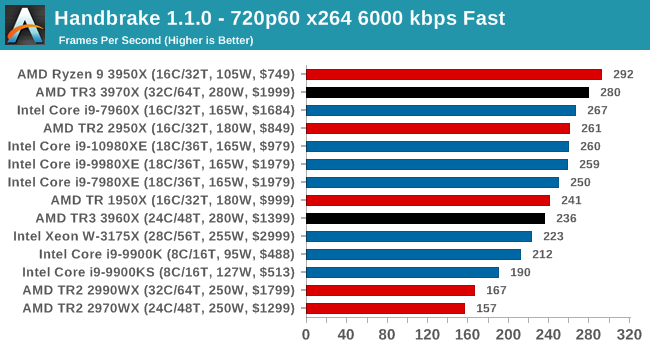
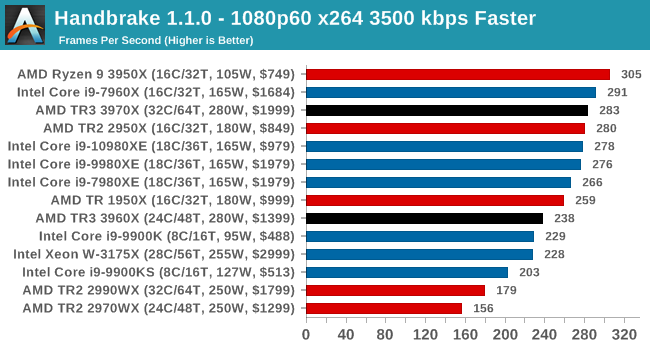
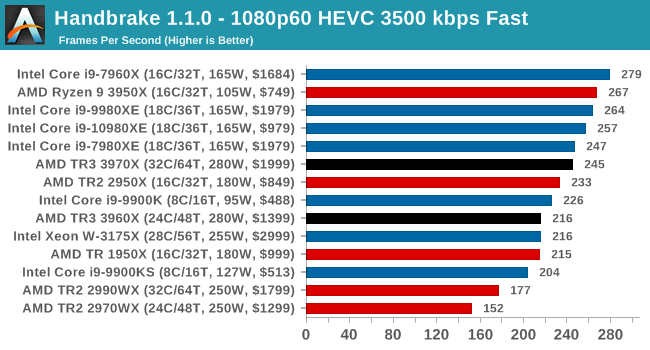
Video encoding is a little varied, based on the variable threaded nature. Certain encoding tests can be more memory sensitive here, or accelerated in different ways, or not scale well with more cores. Either way, TR3 performs a lot better than TR2, but the 3950X seems the best choice.
7-zip v1805: Popular Open-Source Encoding Engine
Out of our compression/decompression tool tests, 7-zip is the most requested and comes with a built-in benchmark. For our test suite, we’ve pulled the latest version of the software and we run the benchmark from the command line, reporting the compression, decompression, and a combined score.
It is noted in this benchmark that the latest multi-die processors have very bi-modal performance between compression and decompression, performing well in one and badly in the other. There are also discussions around how the Windows Scheduler is implementing every thread. As we get more results, it will be interesting to see how this plays out.
Please note, if you plan to share out the Compression graph, please include the Decompression one. Otherwise you’re only presenting half a picture.
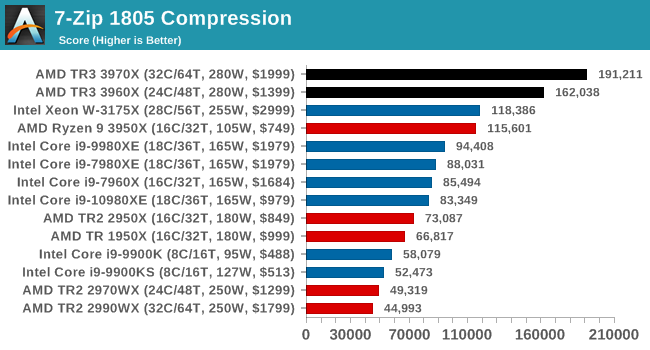
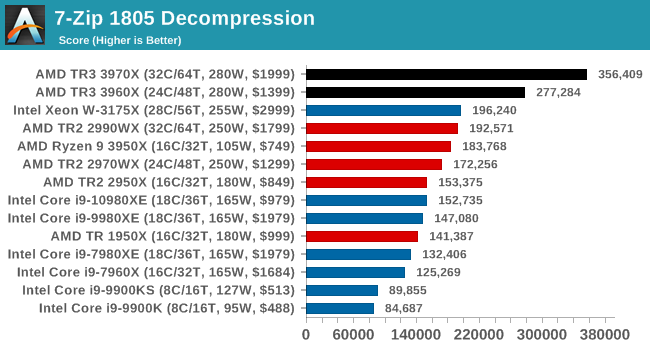
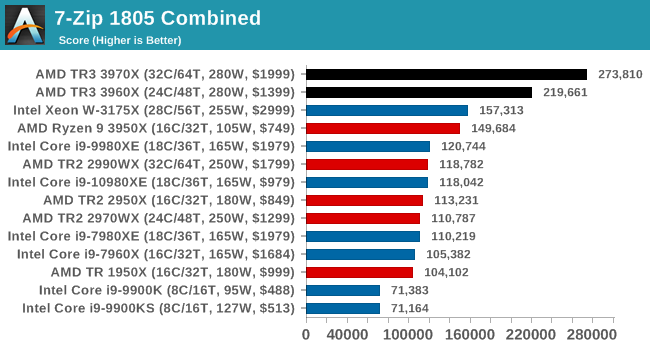
Easily parallel puts the TR3 well ahead of TR2 and Intel.
WinRAR 5.60b3: Archiving Tool
My compression tool of choice is often WinRAR, having been one of the first tools a number of my generation used over two decades ago. The interface has not changed much, although the integration with Windows right click commands is always a plus. It has no in-built test, so we run a compression over a set directory containing over thirty 60-second video files and 2000 small web-based files at a normal compression rate.
WinRAR is variable threaded but also susceptible to caching, so in our test we run it 10 times and take the average of the last five, leaving the test purely for raw CPU compute performance.
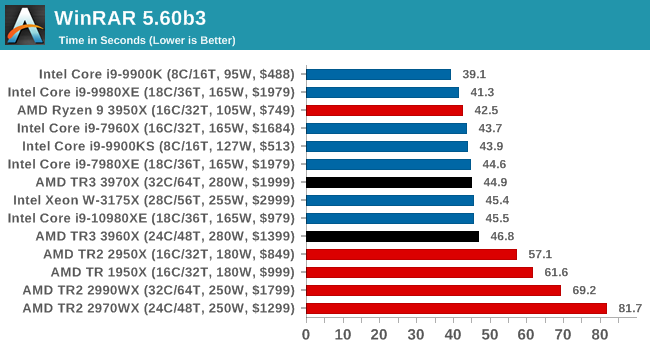
WinRAR is a variably threaded application, and both TR3 processors perform in the same ballpark as anything from Intel. Ideally we should have seen them streak ahead, but we seem to be at a point where CPU frequency or core counts are the limiting factor. At least with Zen 2, there are no issues as there was with Zen 1/Zen+.
AES Encryption: File Security
A number of platforms, particularly mobile devices, are now offering encryption by default with file systems in order to protect the contents. Windows based devices have these options as well, often applied by BitLocker or third-party software. In our AES encryption test, we used the discontinued TrueCrypt for its built-in benchmark, which tests several encryption algorithms directly in memory.
The data we take for this test is the combined AES encrypt/decrypt performance, measured in gigabytes per second. The software does use AES commands for processors that offer hardware selection, however not AVX-512.
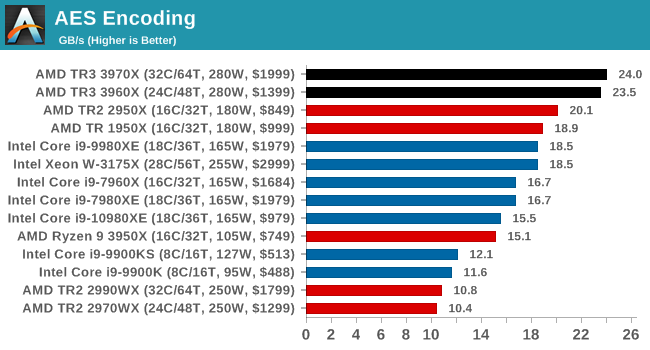










245 Comments
View All Comments
Fulljack - Wednesday, November 27, 2019 - link
well, even 64eu gen11 graphics actually couldn't even surpass vega 10 on 3700u.YazX_ - Monday, November 25, 2019 - link
@melgross, LOL cool story, your butthurt is so obvious, being a fanboy is something but living in denial is something else.the only reason one would post such comment is to be an Intel employee, heck, even Intel employees are admitting their defeat.
JKflipflop98 - Wednesday, November 27, 2019 - link
No, we're not.mickrussom - Tuesday, December 3, 2019 - link
If you really are an Intel employee- shame!, shame!, shame! - especially if you had anything to do with:Spectre 1/2, Meltdown 3/3a, Speculative Store Bypass, Foreshadow, L1TF, Fallout/MSBDS, ZombieLoad/MFBDS, RIDL MLPDS/MDSUM
It is utterly criminal what Intel has done. I have zero respect for Intel and it is only by the grace of the US Government Intel is allowed to live. What is happening to Boeing should be happening to Intel for the criminally negligent brain damaged cheating lying trash-chips they have produced with these horrific faults for over a decade. This is far worse than FDIV. And I got a new CPU for FDIV. This is a crime wave and Intel has received a pardon and all of us are left with broken chips that when patch by the OS run half speed or worse.
So to all Intel employees, you better hold your heads down in utter shame until the next wave of CPUs comes out. And support ECC on all the chips - its criminally negligent to hold people hostage with RAM errors.
WaltC - Monday, November 25, 2019 - link
You don't really understand how the quarterly bookkeeping works, I can see. Intel's last quarter was already set in their ordering channels long before AMD's July launch of Epyc Zen 2, R3k, and TR3k is only now launching--it will be all of 2020 that you will see Intel's P&L's grow progressively leaner as you see AMD's grow progressively fatter. Generally it takes 2-3 quarters of progressively worse business before a company's woes begin to show up dramatically on the balance sheet, due to good will and other bookkeeping dodges. Next year will be a Halcyon year for AMD and a critical year for Intel no question about it. Already their roles have reversed, with Intel becoming the "value proposition"--but only provided Intel keeps on cutting its prices. What we've also seen predicted many times in the past is that AMD was *doomed*...;) Not..quite..;)Jimbo Jones - Monday, November 25, 2019 - link
@melgrose"Intel had its best year yet" ... more 10nm delays, so called "14nm shortages", no 10nm for desktop yet, nothing for server yet, same rehashed 14nm with the 10980XE bringing almost no improvement at all per core meanwhile in one generation Threadripper beings up to 32% improvement in multi, 20% in single thread, with no answer from Intel to any of these processors at all and their flagship 18 core HEDT being almost equal to Ryzen desktop in heavy workloads.
But that's ok, let's look ahead to 2020 ... Comet lake aims at add two cores and add 100mhz ... I guess that's pretty good ... for Intel ... ;-)
What IS impressive though, is Intel's ability to keep squeezing money out of gullible people willing to keep paying more money for less product -- I guess that's how they managed to make so much money last year?
mickrussom - Tuesday, December 3, 2019 - link
yeah, how quickly they forget Spectre 1/2, Meltdown 3/3a, Speculative Store Bypass, Foreshadow, L1TF, Fallout/MSBDS, ZombieLoad/MFBDS, RIDL MLPDS/MDSUM. they took our money and unlike Boeing they go no flak from FEDGOV for it. and then they act like arrogant rotten gordon gecko types while laughing to the bank while the CPUs still coming are patch against those flaws mostly in microcode and OS kernels STILL!maxxbot - Tuesday, November 26, 2019 - link
AMD didn't have these sorts of products in the past, trying to extrapolate past performance into the future is a fool's errand. Intel was the process champ for decades and guess what? It all changed overnightTargon - Tuesday, November 26, 2019 - link
Financials vs. products. Intel financials were up because many people were upgrading from older dual or quad core products, and OEMs are barely starting to offer third generation Ryzen based machines. For your typical consumer, not the gamers who can afford a $500 9900k, but your typical consumer, would you suggest Intel or AMD based products at this point? Intel has the 9600, 9700, and 9900 as good products, the rest are beaten by AMD products at the same price point.arcamdomain - Tuesday, December 17, 2019 - link
Nokia said the same thing about the phone market.